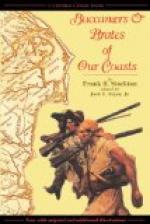Finding that she could do nothing to diminish the number of the buccaneering vessels, Spain determined that she would not have so many richly laden ships of her own upon these dangerous seas; consequently, a change was made in regard to the shipping of merchandise and the valuable metals from America to her home ports. The cargoes were concentrated, and what had previously been placed upon three ships was crowded into the holds and between the decks of one great vessel, which was so well armed and defended as to make it almost impossible for any pirate ship to capture it. In some respects this plan worked very well, although when the buccaneers did happen to pounce upon one of these richly laden vessels, in such numbers and with such swift ferocity, that they were able to capture it, they rejoiced over a prize far more valuable than anything the pirate soul had ever dreamed of before. But it was not often that one of these great ships was taken, and for a time the results of Spanish robbery and cruelty were safely carried to Spain.
But it was very hard to get the better of the buccaneers; their lives and their fortunes depended upon this boom, and if in one way they could not get the gold out of the Spaniards, which the latter got out of the natives, they would try another. When the miners in the gold fields find they can no longer wash out with their pans a paying quantity of the precious metal, they go to work on the rocks and break them into pieces and crush them into dust; so, when the buccaneers found it did not pay to devote themselves to capturing Spanish gold on its transit across the ocean, many of them changed their methods of operation and boldly planned to seize the treasures of their enemy before it was put upon the ships.
Consequently, the buccaneers formed themselves into larger bodies commanded by noted leaders, and made attacks upon the Spanish settlements and towns. Many of these were found nearly defenceless, and even those which boasted fortifications often fell before the reckless charges of the buccaneers. The pillage, the burning, and the cruelty on shore exceeded that which had hitherto been known on the sea. There is generally a great deal more in a town than there is in a ship, and the buccaneers proved themselves to be among the most outrageous, exacting, and cruel conquerors ever known in the world. They were governed by no laws of warfare; whatever they chose to do they did. They respected nobody, not even themselves, and acted like wild beasts, without the disposition which is generally shown by a wild beast, to lie down and go to sleep when he has had enough.
There were times when it seemed as though it would be safer for a man who had a regard for his life and comfort, to sail upon a pirate ship instead of a Spanish galleon, or to take up his residence in one of the uncivilized communities of Tortuga or Jamaica, instead of settling in a well-ordered Spanish-American town with its mayor, its officials, and its garrison.




